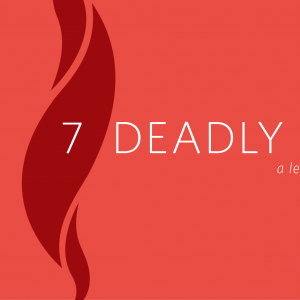
A Lenten Series

I live in Washington D.C., a city in which mistakes are messaged and shortcomings are spun. True confession and true repentance do not occur — unless it is politically advantageous. Naturally, cynicism runs rampant.
In this environment, though we all know our own weaknesses, grace is rarely offered for failures.
Which is why Lent is such an important season on the Christian calendar. It is an opportunity to pause and reflect, to examine our hearts, and to acknowledge the ways in which we have fallen short. But we don’t confess our failures to a public waiting to crucify us. Instead, we confess our sins to one who loves us and was willing to be crucified in order to reconcile us once and for all.
Lent is rarely talked about as a celebration, but it is an opportunity to revel in the joy of forgiveness.
Wrath
Rolling in the Deep — Adele
Mama Said Knock You Out — LL Cool J
Sloth
Lazy Song — Bruno Mars
Je Ne Veux Pas Travailler — Pink Martini
Greed
Rich Girl — Gwen Stefani ft Eve
I Want It All — Queen
Gluttony
Eat It — Weird Al Yankovich
Can’t Stop — Miley Cyrus
Lust
I Want You to Want Me — Letters to Cleo/10 Things I Hate About You soundtrack
I’m Sexy and I Know It — LMFAO
Pride
I’m the Best (clean version) — Nicki Minaj
Devil Went Down To Georgia — Charlie Daniels Band
Envy
Jessie’s Girl — Rick Springfield
Dancing on My Own — Robyn

Man overworking, mast3r / Shutterstock.com
As preoccupied as I get with working, I love the deadly sin of sloth.
Rather, I love to think that I’m above it. I value hard work and I work hard. I judge my days by my to-do lists and the number of items crossed off at the end of the day. It doesn’t matter if my lists are for work during the day, relaxing in the evenings, or even my time off.
On Saturdays I have a list of friends I need to email and get-togethers I want to plan for the coming week. Usually reading at least one chapter of a book makes the list. So do the normal chores of tidying my room and doing the week’s laundry. Not to mention the long list of news articles or theological blog posts I have constantly open on my computer for reading at any resting moment.
And that’s what my rest looks like.
Now that I’ve made myself look like an industrious and hardworking person, let me be the first to say these lists don’t get done. Note I didn’t say they sometimes don’t get finished. I never finish them.

Green-eyed monster, Ralwel / Shutterstock.com
I think what lies at the heart of the mix-up between jealousy and envy is not only the result of many of us zoning out during English class, but may also be a consequence of the way our culture objectifies people. An easy example of cultural objectification is the way women are often portrayed in movies, TV shows, ads, and other forms of media. Women are often the passive recipients of a man’s sexual desire, a designer’s clothing, or a corporation’s product. The message communicated through these portrayals is that women are not people who have dignity, but are objects waiting, and wanting, to be used. Other examples of objectification are bountiful and are sadly all too common in our world.
The objectification of another human being runs directly counter to the Gospel message. By virtue of the fact that all people are created by God — and even made in God’s image, as we are told in Genesis 1:27 — all humans possess a God-given dignity that should not be overlooked. This dignity includes being seen as a unique person with whom a relationship can be nurtured, the ability to lead and contribute to a community, and just being valued and loved for the very fact that the person is God’s creation.

Media consumption illustration, violetkaipa / Shutterstock.com
I tend toward the “eat, drink, and be merry” life philosophy, popularized by the Bible, and also Dave Matthews Band. Growing up in a very large, very loud, very food-centric family in South Texas ingrained this in me, as we gathered many a Sunday around the table(s) to celebrate that month’s birthdays and talk politics, family businesses, and, mostly, the last Seinfeld episode. What you might call gluttony, I call Sabbath — and I’ll quote Scripture at you to prove my point.
So smug was I at my “breaking bread as Jesus did” epicurean lifestyle that I probably should be writing about pride instead. But a few weekends ago, while finishing up season two of House of Cards three days after it released — and also a bottle of Zinfandel — and taking eye-attention breaks to check my Facebook and Instagram feeds (that adorable photo of baby girl only garnered 64 likes?!), and to see how many steps my Fitbit recorded for the day (so much for that post-dinner Skinny Cow), I paused to reflect upon the concept of gluttony.
When does our reliance upon a constant stream of multi-channel entertainment and instant gratification become harmful?

Young woman taking a selfie, Linda Moon / Shutterstock.com
Thought experiment: You are single. You’re eager for a sociable night out on the town. You step into a bar full of attractive people. You:
— See a hot someone across the room and think, I want to be all over him/her.
— See a hot someone across the room and think, I want him/her to think I am so appealing that they just want to be all over me.
Which one is lust?
The lust I heard about in church only ever dwelt on the first train of thought. This lust was an overwhelming desire for someone else, to the point of obsession, objectification, or infidelity. It was dirty, aggressive, mulled over in accountability groups and discussed in sermons of marriage and singleness. ... I didn’t relate to it at all.
In conversation with other close Christian women, I learned they didn’t really relate to it, either. We didn’t treat men or other women as objects of desire. We had hormones, sure, but they were … different. Sometimes we saw men as actively desirable, but not necessarily. We usually just wanted men to want us.
Sometimes we wanted them to want us really, really badly.
Sometimes we needed them to want us. Sometimes that was the only thing we could think about. Sometimes we’d fall into a prolonged pout if men who OBVIOUSLY SHOULD WANT US because we were HOT AND AWESOME, in fact, didn’t.
... Oh. Hmmm.
*Lightbulb*
Is it possible that lust works in multiple ways? Is it possible that the all-consuming desire to be desired is just as lustful as the all-consuming desire to have?

Gluttony illustration, wildfloweret / Shutterstock.com
Small.
If my name had a synonym, that'd be it. At least if we're going by the most-commonly-used word to describe me by both friends and strangers, Asians and non-Asians.
At five-one-and-three-quarters and just a little over 100 pounds, I will be the first to agree: I am small. No matter how much I eat or how little I exercise, I have still been able to get away with jeans and form-fitting dresses from high school. It's great — but the problem is, it makes it all the easier to hide my struggles with food.
A few weeks ago, some of my fellow interns and I decided to celebrate "Fries"-day (Friday) with an Amazon Local deal for Z-Burger. $22 worth of food for just $11. It was an intern's dream come true. It was also two days after Ash Wednesday.
After finishing my last fry, I texted a friend about how greasy my insides felt but how good the splurge was. He shared what he'd had for lunch, and despite my bursting stomach, I responded with "Ooh that sounds so yummy." That's when I realized I had a problem.

Inspirational poster, BlueLela / Shutterstock.com
The first sign I had a problem was when I came across Candy Chang’s “Confessions” project in 2012. It was an interactive art installment on the Las Vegas strip that invited people to come in and confess their deepest secrets anonymously. Those secrets would then be added to a visual art display. It was engaging, unexpected, relevant, discussion-provoking. It was fun.
I hated it.
More correctly, I loved it; and hated myself for not actively doing something similar. I wondered how to implement a version of this idea among colleagues and in office hallways of my organization at the time; I considered “art-bombing” the streets of my city with thought-provoking questions; I spent several moments over the next several weeks seriously questioning whether I should drop everything to focus on Chang-style installations, because I could, and I liked it, and it would work, so I should be doing it. Nothing else I was currently doing mattered. Not without this one thing more.
Welcome to an exhaustive (and exhausting) self-talk: the fixation on never doing enough. Until very recently, I thought this way almost all the time. Somehow — accidentally, almost imperceptibly — years of nurturing my professional and creative pursuits was nurturing something else, as well. It became nearly impossible for me to see work that I admired and appreciated and to not simultaneously think, “I should be doing that, too.”
Which is, simply put, raging covetousness.

Man screaming, ollyy / Shutterstock.com
Wrath is the only one of the Seven Deadly Sins we attribute to God. And, as pastor Bob, my confirmation teacher in 8th grade would be glad to know I remember, the definition of sin according to the catechism of the Evangelical Covenant Church and similar to most Christian traditions is that sin is “all in thought word or deed that is contrary to the will of God.”
This definitional conundrum raises a few questions. Is it wrong to speak of God’s wrath? Wrong to list wrath among the Deadly Sins? Or are there certain things that are only sins if humans do them but are appropriate to the Divine?
I would argue that yes, wrath can be sinful, but it is not necessarily so. And that during this Lenten season the challenge is not always to suppress wrath but expressing a wrath that is in fact the appropriate response to injustice we see around us every day. In fact, a misguided attempt to avoid wrath can lead to a sin of omission in the failure to practice the “Cardinal Virtue” of justice.

Envy concept, stockphoto-graf / Shutterstock.com
I drive a Prius. I wouldn't exactly say it's a sexy car; the word "practical" comes to mind. It gets good mileage, is safe, and fits our family of four just fine in most cases. It's gotten its share of bings and dents over the years, but it has been a very reliable and low maintenance way to get around town.
Of course, what I really want is a Tesla. My son wants one too. There is a showcase for them in a local storefront, and he begs me to go by for a visit every time we are nearby. Though he is only 10, he already makes a pretty strong case to my wife, explaining how much of the cost of the car will be offset by the savings in gas, and he was elated to find out it was recently rated the safest car on the road.
So far it hasn't worked in our favor. But we keep trying.
This, of course, is not envy; it is simply good old-fashioned greed. The thing I have is sufficient, only until something newer, edgier, shinier comes along (which, in America, is a daily occurrence). Then suddenly, perfectly good car in our driveway has shortcomings and liabilities that were, hereto for, invisible to us.
Envy is different, and I would argue that it actually is worse than greed. While the latter is simply our desire off of its proverbial chain, envy gets personal. It is the easy but unattractive marriage of greed and judgment. Yes, we desire what someone else has, but there is more to it. When we are envious, we gain nearly as much pleasure from the idea of the other person not having the thing we want as we do from the idea of having it ourselves.

Nude art photogaph, Viktoriiapdb / Shutterstock.com
I lust. The words almost seem like they could be a tagline for a new Apple product — an appropriate image perhaps for a generation that is glued to our smart phones. Or perhaps the words are better suited in a kind of Descartes revolution for the 21st century, “I lust, therefore I am.” In either scenario, the words are an accurate reflection of the inescapable truth that lust is consuming all of our lives.
In the church, the word lust has strong sexual connotations. It is a word we are ashamed of and work hard to ignore. When we do talk about lust, it is mostly in the context of uncomfortable sermons or youth group sessions about dressing modestly, not looking at porn, and not gazing at one another with desire. We also often think of lust as a sin that plagues only men — particularly young men with “raging hormones” and that it is something they need to “break free” from.
Essentially the message has become, “If you do lust, don’t; if you don’t lust, good.” But such assumptions do not accurately represent the complex and diverse ways that lust manifests itself in our lives. That being said, I sometimes think that if the seven deadly sins included a clause for a sin that was more deadly, feared, and misunderstood than all of the rest, this would be it.

Baby sloth, Vilainecrevette / Shutterstock.com
Sloth. It’s not just a strange, adorable animal we love to watch in videos. It’s also one of the “Seven Deadly Sins,” and one that I find hanging around in my daily life.
I didn’t think about sloth in particular when I chose my Lenten practices for this year, but it turns out to be the very beast (sorry) I’m trying to walk away from.
To be clear, I’m a pretty active person. I walk to work, run long distance, and I’m also very social. But the fact is, every night I look forward to getting home and enjoying what I tell myself I’ve earned: as much time on the couch watching TV and eating as I want. It’s relaxing, I figure, and takes no mental or physical energy.
This is the proverbial sloth in the room.
Yes, unwinding is good, but here’s the problem: I’m not really getting any rest from this. Sure, I’m lounging, and my brain takes a rest if I’m watching something inane; but as a Christian, rest means something different than it does for other people. Rest means Sabbath. Sabbath is the day of the week that we hold sacred, the day when we rest from our usual work and worries, the day that we give back to God and use to worship God. So ironically, my approach to getting the sloth out of my life is to bring the Sabbath into it, at the end of each day.

Close up of peacock, CoolR / Shutterstock.com
Let those who boast, boast in this, that they understand and know me, that I am the Lord; I act with steadfast love, justice, and righteousness in the earth, for in these things I delight, says the Lord.” (Jeremiah 9:24, NRSV)
Pride has taken many forms in my life, but most dangerously in this: I have taken myself far too seriously. You wouldn’t think that a neurotic worrier who spent eight years in therapy would be full of pride. But for years I was utterly consumed with anxiety over what would happen in my life, because I believed that it should go a certain way and that I had both the responsibility and ability to bring that about.
So there’s nothing like having your worst fear come true — 19 months* of unemployment in a bad economy — to show you how small you really are, especially compared to God.
It was kind of amazing.